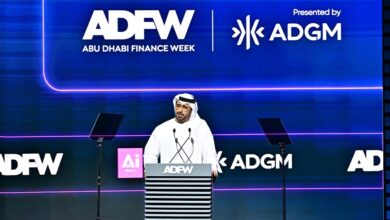Bill Qian’s Trailblazing Leadership: Cypher Capital’s Impact on the MENA Blockchain Landscape and Beyond
In the fast-paced world of blockchain investments, where the market conditions can change in the blink of an eye, Cypher Capital has emerged as a significant player.
Launched in March 2022, it quickly became the largest blockchain fund in the MENA region. However, as the crypto market experienced its fair share of turbulence, Walid Abu Zaki, Founder and CEO of UNLOCK Blockchain, sat down with Bill Qian, the Chairman of Cypher Capital, after 17 months of operations, to gain insights into their investment strategy and how they navigated through challenging market conditions.
A Diverse Investment Strategy
Cypher Capital’s journey in the blockchain space has been marked by adaptability and innovation. Bill highlighted their diversified investment strategy, which includes Bitcoin mining, public market investments, and venture capital.
This unique approach allows Cypher Capital to not only ride the wave of Bitcoin’s growth but also actively support and enable exceptional founders in the blockchain space.
Bill explained, “We invest to enable and help exceptional founders generate more alpha from venture capital investments. Our approach isn’t solely about chasing trends but about nurturing projects and talents in this rapidly evolving ecosystem.”
Thriving in Bear Markets
The interview delved into Cypher Capital’s resilience, especially considering the bear market conditions that have characterized the cryptocurrency landscape recently.
Bill expressed that the firm’s establishment in the midst of a bear market had its advantages. “Timing was on our side,” he noted. “We kicked off in the bear market, which gave our founders a solid starting point. Additionally, we mostly rely on in-house evergreen long-term capital, so we don’t face external investor pressure.”
Cypher Capital’s patience and long-term outlook allowed them to weather the market downturn with confidence. Bill emphasized their preference for projects and founders capable of raising sufficient capital during challenging times, reinforcing the idea that only the survivors ultimately succeed when market sentiment turns.
Performance in the Portfolio
The interview then shifted focus to Cypher Capital’s portfolio performance. Bill highlighted their early investments, particularly one project that grew from a $5 million investment to a market cap between $5 to $8 billion. However, given the nature of venture investments, most projects are still in the development phase.
Staying True to Token Investments
One distinguishing factor of Cypher Capital is its focus on token investments, rather than equity. Bill explained this choice, citing the global market conditions.
“The equity market hasn’t been favorable lately, especially with rising interest rates and global recession concerns. We see more opportunities within the token market.”
Quian’s optimism stems from the fact that only around 500 million people are currently engaged in the global token ecosystem, compared to over 5 billion mobile internet users. This presents a significant growth potential, which Cypher Capital aims to harness as the industry continues to evolve.
A Global Perspective
Cypher Capital, despite its MENA location, positions itself as a global fund. Bill emphasized their commitment to identifying and incubating local talent while also offering global projects access to regional expertise, regulatory connections, and market intelligence.
Their 10,000-square-foot co-working space in the Dubai Marina has played a pivotal role in fostering collaboration and innovation within the blockchain ecosystem. In fact, this space has attracted founders and developers worldwide, further solidifying Cypher Capital’s status as a global player.
Seizing the Opportunity
The conversation then shifted to a probing question: Are you satisfied with the quality of projects growing in the MENA region, particularly in terms of homegrown initiatives?
Bill candidly expressed concerns about the lack of groundbreaking projects, emphasizing the prevalence of repetitive attempts to mimic or modify existing solutions. The absence of substantial, homegrown innovations on the global stage appears to be a pressing issue.
Bill also acknowledged the challenge, attributing it to the region’s relatively nascent ecosystem. He pointed out that few projects in the MENA region start from the very inception of an idea. However, he does recognize the emergence of world-class, top-tier projects, some of which have relocated their teams to the region.
This migration, he suggested, requires time, as the UAE, unlike Silicon Valley, lacks the ready-made talent pool associated with prestigious institutions like Stanford University and UC Berkeley.
Attracting Talent: A Key Strategy
The dialogue takes an optimistic turn as Bill highlighted the region’s strengths. The UAE’s appeal lies in its favorable environment, openness, regulatory framework, and robust infrastructure.
It becomes clear that the strategy to foster local innovation hinges on attracting experienced founders to the region. By luring established talent, the MENA region can pave the way for homegrown projects with the potential to become unicorns.
Evolving Blockchain Funding
The conversation explored the evolution of blockchain funding in the MENA region over the past few years. Walid Abu Zaki pointed out how Cypher Capital pioneered significant investment in the region. However, he raised an important question: has the size of investment translated into meaningful deployment of blockchain technology?
In reply to the question, Bill painted a nuanced picture, highlighting that while the dry powder available for blockchain investments in the MENA region may not match Asian or American standards, it is not a bottleneck for the growth of the local web3 industry. This is because blockchain fundraising differs from traditional venture capital.
In web3, both founders and capital sources are global in nature. The presence of a talented workforce, rather than the size of available capital, takes precedence in this context.
Navigating Regulatory Waters
Blockchain’s fintech nature prompts the discussion of regulatory influence on investment decisions. Bill acknowledged the importance of regulation in web3, where real-world assets often interface with blockchain technology.
He also emphasized the necessity of striking a balance between a sophisticated regulatory environment and maintaining openness and flexibility to encourage innovation. Nonetheless, he commended regulators in the UAE for their willingness to engage with founders, tweak regulations when necessary, and maintain a conducive business environment.
Emerging Trends and Opportunities
The interview concludes with a glimpse into emerging trends that excite Cypher Capital. Notably, the discussion centers on tokenization, particularly of real-world assets like real estate or customer royalties. Tokenization is seen as a transformative technology, breaking geographical and regulatory barriers, and increasing efficiency and value in supply and demand markets.
In the rich context of this dialogue, we glimpse a region poised at the edge of profound blockchain innovation. Its journey is underpinned by the relationship between the attraction of global talent and the nurturing embrace of a flexible regulatory framework.
As the MENA region steadily ascends as a burgeoning blockchain hub, it carries within it the potential to not only shape its own destiny but also to leave an indelible imprint on the global stage of blockchain innovation and transformative technology.





